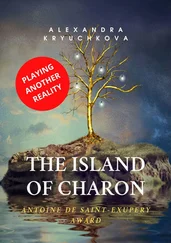“That’s very kind,” I say.
“Breakfast is at seven, after sunrise service. Please come. The sisters would love to meet a friend of Janet’s.”
“Has she had many visitors?” I ask.
Sister Rosie smiled and took my hand, squeezing it fiercely. “You’re the only one, dear. And we’re very glad you’ve come.”
I’m lying in the bed the priests sleep in, in my underwear and one of Carey’s undershirts. I took it out of the laundry bag before I left. He had worked all day in it, under his uniform — the unseasonably hot spring, early fire season on the way. He wore it at least two days ago. It’s slightly rank, but soft.
I smell him and count the lithium pulse of my watch till I sleep.
In the dining room I say hello to every sister. This is the journalist in me: talk to everyone, make eye contact. I can’t help it, anyway; they are either watching me as I go through the cafeteria line or they are blind. I am taller than the women in front of me, a head above their delicate, veiny skulls. Someday, I may be this old, my body shrunken, translucent.
There’s a toast station and I wait with one of the sisters, my bread in one side of the toaster and her bread in the other. She doesn’t know who I am or why I’m here. Her name is Sister Rosemary.
“Rosemary,” I say. “There are so many ‘roses’ here.”
“Yes, yes,” she says with a dismissive wave. She is at least ninety years old.
“What year were you born, Sister?” I ask. I want to know if I’m right.
She doesn’t blink an eye: “Nineteen twenty-two,” she says. “And I still do the New York Times crossword every day.”
She offers to butter my toast — I forgot to take a knife. I accept and watch as she slathers a tablespoon over four square inches of wheat bread.
I sit with Sister Rose and Sister Rosa, born in Mexico City, 1930. I want to keep them all straight, but I don’t know how I’ll do it, so I decide to call them all “Sister” no matter what. Like they did with Sister J. at the Colony, as if it were her given name. Soon we’re joined by Sister Michael, who tells me she’s a Kennedy.
“Really?” I say.
And she says: “It’s not as glamorous as everyone thinks it is.”
“Oh, no?” She tells me how many cousins there were, how many divorces, how many illegitimate children, how she was the last of four girls to wear the hand-me-down shoes. I nod and eat my eggs.
Sister Rosa asks me what I am doing with my life, like my own grandmother might, if I were sitting at her breakfast table on a bright spring morning. I tell her I’m living with a park ranger in the Oregon wilderness, writing about Sister J. and what she did on Marrow Island.
She burps behind a napkin and leans across the table. I prepare myself for a lecture on living in sin.
“We’re not supposed to call her ‘Sister’ anymore,” she says.
“Oh,” I say. “Well, Janet, then.”
Then she shakes her head. “I don’t care what she did, she’ll always be a Sister to me.”
I think about telling her who I am. That Sister J. went to prison because of me. Or because of what I knew. Even now it feels tenuous — the case against her and all of them. But Sister Rose asks me, mouth full of oatmeal, what it’s like living with a park ranger and whether he wears a uniform. And I tell them about Carey. Of course they love a man in uniform as much as — if not more than — other women.
Sister Rosie finds me at breakfast and tells me that Janet is awake and asking for me. They’ve told her that I’m here. And she seems very alert, very lucid, Sister Rosie says. I say goodbye to the sisters and listen to them talk about me as I walk my tray to the dish bins. They’re hard of hearing, so they don’t bother to whisper. They believe I’ll marry the park ranger and have a baby. A little babe of the woods. It’s the sort of nativity they can believe in, even if I can’t.
Sister Rosie takes my arm, as before, and leads me across the polished entry again, through a different set of doors and into another wing. This one has a distinct nursing home smell, though it looks just like the other wings with its linoleum and crosses and a sort of absent-minded silence, as if it didn’t occur to anyone to make a fuss, to make any noise at all.
“Janet wouldn’t come at first,” Sister Rosie tells me. “She wanted to stay in Walla Walla. The women there — in the prison — they liked Janet, you know. It’s not often they get somebody like Janet.”
“A nun?”
“Oh, no. We’re sisters, not nuns. Such a funny word. Nun . Like nothing at all . No, we’re sisters . Nuns are cloistered. We live with the rest of you, believers and unbelievers alike. We don’t just pray — we fight the good fight. We go to jail more than you’d think, and we die like soldiers, sometimes. Even so, Janet is an original. She was always… her own woman.”
“Did you know her before?”
“I ‘knew her when,’ as they say. She was always asking questions. Always wanting to change people’s ways. Even if it meant putting herself in the path of power…”
We stop at a door in the hallway, blinds down over a window to the side.
“Prepare yourself,” she says. “She’s very near the end.”
As prepared as I think I am to see this woman — I practiced by picturing the mummified remains, the ones in South America that have been taken over by fungus as the climate has changed — I am not prepared. She’s alive, but she doesn’t look human. She looks like an insect, folded into the bed, yellow and desiccated.
The eyes don’t shrink, but the flesh does, the body does what it can to keep the heart beating. It takes the meat first, the muscles and their coats of fat; collagen under the skin, in the lips, swallowed up by hungrier cells; the skin falls, shedding like generations of wallpaper. But the eyes — however well they actually see —are cartoonish orbs, accented by the bones of the brow that do not recede with the plump cheeks, but hang over the eyeballs like angry gargoyles, like architectural admonishments.
But I see her enormous eyes recognize me, and I cross the room.
“They call it ‘the Inland Empire’ out here,” Janet says, stopping to swallow every several words. It’s sharp, the swallowing. I can hear the esophagus creaking. She’ll let me moisten her lips by holding a small paper cup of water to them, letting the water drip over them, but she won’t drink. “The mountains, the rivers, the Palouse, all the way down to the Columbia. It doesn’t feel right. Using a word like empire in this day and age. As if we could ever own any of this. It owns us.” Speaking exhausts her, but for the moment, she wants to get out whatever comes into her head. I sit next to her bed holding her hand, careful of the portacath at the top of her wrist.
“It’s too quiet here; I miss the sea,” she says, and falls asleep.
They’re giving her regular morphine injections for pain now, and she sleeps intermittently. I walk around. There’s nothing of Janet’s in the room, but then she didn’t have any possessions to begin with. I thought there might be books, but she can’t read anymore. A picture of the island, maybe. If ever she felt ownership for anything, it was Marrow Island. Her island. A picture of Maggie wouldn’t have surprised me, but she would probably hide it, keep it close to her body. Maggie is still in prison.
I don’t want to leave the room, in case she wakes, but I’m getting a headache from the smell — like isopropyl alcohol and feet. I step out into the hall to ask the sister at the nurses’ station whether I can open the windows. She says she doesn’t see why not and follows me back into the room. I crank the windows open, and the smell of the rose garden comes wafting in. The sister places a hand on Janet’s wrist to feel her heart rate, and after a moment she leans down and tells her, in a voice so soft I can barely hear, that it’s time to change her “trousers.” This sister is younger than the others — maybe my age, maybe younger — and she has a Spanish accent; her name is Monica. Janet grunts and looks confused to see both of us.
Читать дальше












